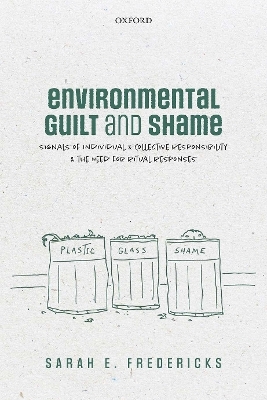
Environmental Guilt and Shame
Oxford University Press (Verlag)
978-0-19-884269-9 (ISBN)
Bloggers confessing that they waste food, non-governmental organizations naming corporations selling unsustainably harvested seafood, and veterans apologizing to Native Americans at the Standing Rock Sioux Reservation for environmental and social devastation caused by the United States government all signal the existence of action-oriented guilt and identity-oriented shame about participation in environmental degradation. Environmental Guilt and Shame demonstrates that these moral emotions are common among environmentally friendly segments of the United States but have received little attention from environmental ethicists though they can catalyze or hinder environmental action. Concern about environmental guilt and shame among “everyday environmentalists” reveals the practical, emotional, ethical, and existential issues raised by environmental guilt and shame and ethical insights about guilt, shame, responsibility, agency, and identity. A typology of guilt and shame enables the development and evaluation of these ethical insights.
Environmental Guilt and Shame makes three major claims: first, individuals and collectives, including the diffuse collectives that cause climate change, can have identity, agency, and responsibility and thus guilt and shame. Second, some agents, including collectives, should feel guilt and/or shame for environmental degradation if they hold environmental values and think that their actions shape and reveal their identity. Third, a number of conditions are required to conceptually, existentially, and practically deal with guilt and shame's effects on agents. These conditions can be developed and maintained through rituals. Existing rituals need more development to fully deal with individual and collective guilt and shame as well as the anthropogenic environmental degradation that may spark them.
Sarah E. Fredericks is Associate Professor of Environmental Ethics at the University of Chicago Divinity School. She is the author of Measuring and Evaluating Sustainability: Ethics in Sustainability Indexes (Routledge, 2013).
List of Tables
1: Introduction
2: Evidence of Environmental Guilt and Shame
3: Typology of Guilt and Shame
4: Philosophical Arguments for Individuals, Memberships, and Collectives in States of Guilt or Shame
5: Environmental Guilt and Shame
6: Critics of Emotions and Collectives
7: Ethics of Environmental Guilt and Shame
8: The Ethics of Inducing and Responding to Guilt and Shame
9: Ritual Responses to Environmental Guilt and Shame
Epilogue: Looking Back, Looking Forward: Lessons from Studying Environmental Guilt and Shame
Works Cited
| Erscheinungsdatum | 04.10.2021 |
|---|---|
| Verlagsort | Oxford |
| Sprache | englisch |
| Maße | 165 x 241 mm |
| Gewicht | 522 g |
| Themenwelt | Geisteswissenschaften ► Philosophie ► Ethik |
| Geisteswissenschaften ► Religion / Theologie | |
| Naturwissenschaften ► Biologie ► Ökologie / Naturschutz | |
| ISBN-10 | 0-19-884269-4 / 0198842694 |
| ISBN-13 | 978-0-19-884269-9 / 9780198842699 |
| Zustand | Neuware |
| Haben Sie eine Frage zum Produkt? |
aus dem Bereich


